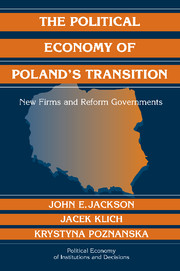Book contents
- Frontmatter
- Contents
- List of Tables
- List of Figures
- Acknowledgments
- List of Abbreviations
- 1 Why Poland?
- 2 The Dynamics of the Polish Political Economy, 1990–1997
- 3 Creative Destruction and Economic Transition
- 4 The Social and Distributional Costs of Transition
- 5 Individual Attitudes and Voting
- 6 De Novo Job Creation and Election Returns
- 7 Liberal Economic Interests and Seat Allocations
- 8 The Political Economy after 1997
- 9 The Political Economy of Transition: Why Poland?
- Appendix A Assessing Measures of New and Small Firms in Poland
- References
- Index
- Titles in the series
5 - Individual Attitudes and Voting
Published online by Cambridge University Press: 07 August 2009
- Frontmatter
- Contents
- List of Tables
- List of Figures
- Acknowledgments
- List of Abbreviations
- 1 Why Poland?
- 2 The Dynamics of the Polish Political Economy, 1990–1997
- 3 Creative Destruction and Economic Transition
- 4 The Social and Distributional Costs of Transition
- 5 Individual Attitudes and Voting
- 6 De Novo Job Creation and Election Returns
- 7 Liberal Economic Interests and Seat Allocations
- 8 The Political Economy after 1997
- 9 The Political Economy of Transition: Why Poland?
- Appendix A Assessing Measures of New and Small Firms in Poland
- References
- Index
- Titles in the series
Summary
The evolution of attitudes about the economy and about who should govern is an integral part of the transitional dynamic in Poland. To integrate the development of Polish attitudes toward various economic and social institutions with our model of the economic evolution, we first consider economic institutions because they affect a wide range of attitudes and perceptions and place substantial constraints on the actions of different political parties. Thus, the Polish transition was based on developing not only a new economic order but also a new set of political institutions and procedures. These political and economic changes are deeply interrelated, and their development and ultimate properties are pieces of a single process. To illustrate this process, we begin with an analysis of two individual attitudes that are central to the Polish political transformation.
Chapter 2 gave a brief description of the political events, and particularly the elections, in Poland since the transition began. Central to these events are the individual's attitudes toward private enterprise and its role in the new Polish economy and about Communism and former Communist officials. This attitude is particularly important as the main opposition to the economic reforms came from parties composed of former Communist officials. This meant that voters who might be opposed to the economic reforms had to vote for a former Communist to express that opposition. Opinions about communism were also likely influenced, in part, by the assessment of the reforms.
- Type
- Chapter
- Information
- The Political Economy of Poland's TransitionNew Firms and Reform Governments, pp. 122 - 156Publisher: Cambridge University PressPrint publication year: 2005



